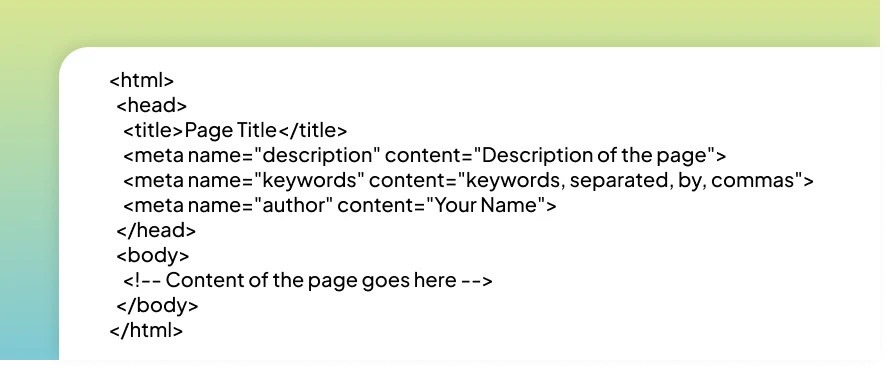
How to Write Metadata for SEO

- ZARYAB
In the digital marketing world, first impressions can occur even before anyone reaches your website. How? Through metadata. Not only do these behind-the-scenes bits of information inform search engines about the content of your page, but they also help draw users to your link in the midst of chaotic search results.
This article will answer all of your questions about what metadata is and how it may improve your SEO. Let’s review all the information available on how to write compelling, click-engaging metadata that improves ranks and increases traffic.
What Is Metadata?
In simple terms, metadata is “data about data.” Think about it in terms of answering the search question: why is this even on a webpage if readers and search engines can’t understand it? For SEO, the two most crucial kinds of metadata are:
- Meta Title (Title Tag): The clickable headline that appears on search engine results pages (SERPs).
- Meta Description: A brief statement that summarizes the content of the page and appears beneath the title tag.
Despite not directly influencing SEO ranking, metadata has a significant impact on click-through rate (CTR), which in turn affects search results.
Why is metadata important for SEO?
- Enhances Visibility: Having well-crafted metadata enables search engines to index and interpret your page appropriately.
- Increases Click-Through Rate (CTR): Eye-catching headlines and compelling blurbs lead users to click on your link rather than someone else’s.
- Sets Expectations: Metadata informs users in advance of what they will see when they reach your page, which enhances the user experience and can also help reduce your bounce rate.
- Boosts Relevance: Well-crafted metadata indicates to searchers that your content is precisely what they are seeking when it matches their keywords and intent.
Elements of Strong SEO Metadata
1. Meta Title (Title Tag)
- Length: Keep it under 60 characters (Google cuts off titles longer than that).
- Choose Keywords: That’s where your main keyword comes in, and add it near the beginning.
- Be Specific: What it is about the page and what it is not.
- Add Branding (If You Want): Then you can finish the title with your brand for trust.
Example:
Do: How to Write Metadata for SEO | YourBrand
Don’t: Metadata | Metadata Writing Metadata SEO
2. Meta Description
- Length: Shoot for 150 to 160 characters.
- Keywords in Bold: Sometimes they appear in bold (In SERP, making it visible).
- Make It Persuasive: Consider it advertising copy, and tease a benefit or a call to action.
- Don’t Duplicate: You should have a different meta for every page.
Example:
How to write effective metadata for SEO. Learn how to write meta titles and descriptions that will rank and convert to clicks.
Metadata Best Practices vs. Common Mistakes
| Element | Best Practice Example | Common Mistake Example |
| Meta Title | “What is Metadata? SEO Guide for Beginners” | “Home Page – Welcome” |
| Meta Description | “Boost SEO with strong metadata. Learn how to write titles and descriptions that attract clicks.” | “This is a webpage about metadata.” |
| Keywords Usage | Naturally placed in the first half of the title and description | Keyword stuffing or irrelevant keywords |
| Uniqueness | Each page has a tailored title and description | Duplicate metadata across multiple pages |
| User Intent | Aligned with what searchers expect to find | Misleading or vague metadata |
5 Metadata Writing Tips That Will Work for You
- Consider the User Intent: It always comes down to, what is the searcher looking for? So write titles and descriptions that directly address that.
- Opt for Action-Oriented Words: Words like learn, discover, explore, find out, boost, and grow will prompt users to click.
- Balance Keywords and Readability: Keywords are important, but avoid robotic phrases. Write naturally while still including terms like what metadata is and SEO.
- Make Every Page Unique: Metadata should reflect the unique value of each page, not just copied and pasted across the site.
- Test and Optimize: You can see which of your pages have a low CTR by using tools like Google Search Console. Adjust metadata and monitor changes.
Common Mistakes to Avoid
- Writing vague or generic titles like “Home” or “Blog”.
- Stuffing too many keywords, making metadata unreadable.
- Ignoring meta descriptions and letting Google auto-generate them.
- Writing titles/descriptions that don’t match page content (this increases bounce rate).
- Forgetting mobile users, ensure your metadata looks good on smaller screens too.
The Bigger Picture: Metadata and SEO Strategy
Metadata is most effective when used as part of a larger SEO strategy. On its own, it isn’t enough to earn high rankings, but it factors into:
- Click-through optimization (CTO): making your search listings even more attractive.
- On-page SEO congruency: matching metadata to headers, keywords, and body text.
- User confidence: consistency between what users read in SERPs and the webpage.
Think of the metadata as the “shop window” of your website. A cool, inviting front window lures them in. If your metadata is so sloppy or blah that nobody will click on the best content hiding inside, it may as well not even be there.
Metadata for SEO: Key Statistics & Source-Based Insights
Meta Title (Title Tag) Insights
- Optimal Length for Higher CTR: Titles between 40–60 characters yield a much better CTR—about 33.3% higher than those outside this range Backlinko.
- Shorter Tags Also Perform Well: Title tags of 15–40 characters see an 8.6% higher CTR compared to longer tags Keyword.com.
- Risk of Truncation & Rewrites: Titles exceeding the recommended limit are more likely to be rewritten by Google. In fact, Google rewrites title tags 57% of the time if they exceed 60 characters, VictoriousSeoProfy.
Meta Description & Snippet Impact
- Users place high importance on meta descriptions: 74% of web users say they judge whether to click based solely on them twoimpress.com.
- SEMrush found optimized meta descriptions can increase CTR by around 5.8% twoimpress.com.
- Another source reports that strong title tags and descriptions can boost clicks by up to 36%, and CTAs alone can raise CTR by 22% on average MoldStud.
Conclusion
Metadata offers you a chance to stand out from the competition, engage visitors, and drive actual traffic to your website. It is not only a technical SEO requirement. By creating informative, authoritative meta titles and descriptions, you are informing Google and your audience that the material is valuable.
So, when you wonder what SEO metadata is and what metadata does for SEO, don’t forget: God is in the details. Metadata isn’t sexy, but if you get it right, it can take your SEO strategy from invisible to irresistible.
FAQs
What is metadata in SEO?
Metadata is the title and the description that explain what your webpage is all about for both search engines and users, and is displayed in search results.
How do I write the meta title and SEO?
It should be no more than 60 characters, have your primary keyword close to the start, and be clickable, clear, and descriptive.
Is meta description a ranking factor or not?
Not so, but rather it is a great signal for Click-Through Rate (CTR), which is believed to help with rankings.
How long should your meta description be?
To avoid search results being truncated, it is preferable to have between 150 and 160 characters.
Can I share metadata for several pages?
No, each page should have metadata unique to that page in order to prevent issues and possible SEO penalties.

With over 8 years of hands-on experience in Search Engine Optimization (SEO), Zaryab Khan is a seasoned professional dedicated to enhancing online visibility and driving organic growth for businesses worldwide. Holding a Bachelor of Science in Computer Software Engineering from National Textile University, Zaryab combines technical proficiency with strategic insight to deliver measurable SEO results.

At SEOstrategi, we are your growth partners, focused on helping your business succeed with tailored strategies, expert support, and a commitment to increasing visibility, traffic, and conversions in Norway.







